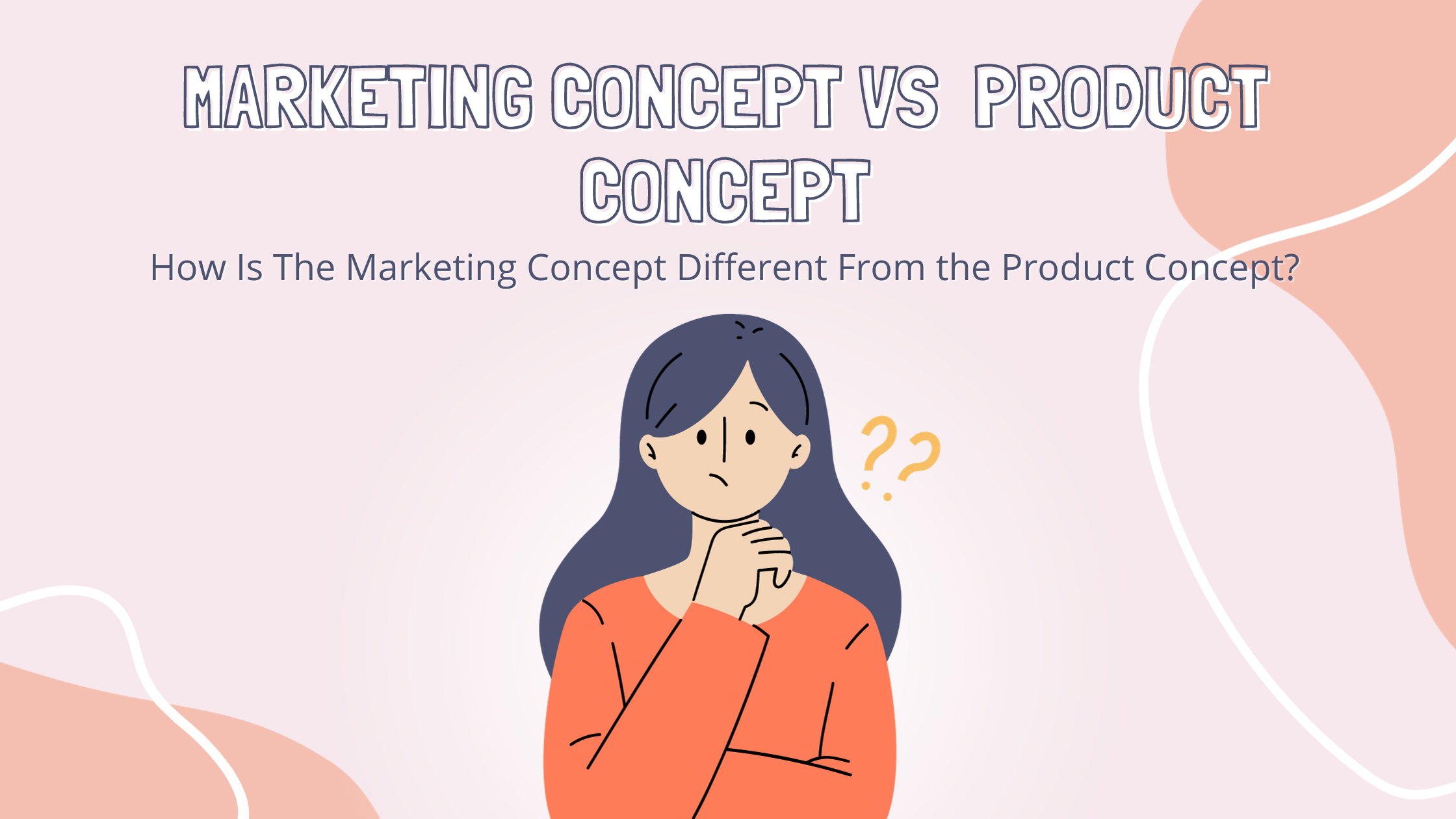How Is The Marketing Concept Different From The Product Concept?
In the dynamic business world, two fundamental concepts play pivotal roles in shaping strategies and driving success: the Marketing Concept and the Product Concept. While both are integral to a company's growth, they represent distinct approaches with unique focuses. In this blog post, we'll delve into the nuances of these concepts, unraveling their differences and exploring how they contribute to the overall success of a business.

What Is The Marketing Concept?
The Marketing Concept is a customer-centric philosophy that revolves around the idea of satisfying customer needs and wants. Unlike earlier production-oriented approaches, this concept places customers at the forefront of business decisions. The core tenets of the Marketing Concept include:
a. Customer Focus
Identifying and understanding the needs and preferences of the target audience is paramount. This involves comprehensive market research to gather insights into consumer behavior.
A crucial aspect of the Marketing Concept is providing value through optimized content; high-quality SEO content can effectively address customer needs by enhancing visibility and engagement.
Sales funnels are the best way to gather such deep insights about your customers and the ClickFunnels funnel builder is a great tool to create beautiful and effective sales funnels to make your life easier.
Customer journey analytics tools like Woopra help track everything users inside the funnel journey. Implementing omnichan
Coordinating all aspects of marketing, from product development to promotion and distribution, to ensure a seamless and customer-centric experience.
c. Profit through Customer Satisfaction
The ultimate goal is to achieve long-term profitability by consistently meeting or exceeding customer expectations. Satisfied customers are more likely to become repeat customers and brand advocates.
What Is The Product Concept?
The Product Concept is rooted in the belief that consumers prioritize quality, performance, and features over other factors. This approach assumes that if a product is of high quality and meets certain standards, it will inherently attract customers. Key features of the Product Concept include:
a. Product Superiority
Emphasizing the need for superior product attributes and functionality to outshine competitors in the market. In industries such as manufacturing, maintaining high product standards and continuous innovation is crucial for staying competitive and meeting customer expectations.
b. Innovation and Technology
Continuous improvement and technological advancements are crucial for maintaining a competitive edge.
c. Limited Customer Involvement
While customer feedback is considered, the primary focus is on creating a product that stands out based on its inherent qualities.
What Are The Differences Between Marketing And Product Concepts?
Source: Photo by Kaboompics
Focus on Customer vs. Focus on Product
1. Marketing Concept centers on understanding and meeting customer needs.
2. Product Concept centers on creating a superior product, assuming that quality alone will attract customers.
Long-term Relationships vs. One-time Transactions
1. Marketing Concept aims at building long-term relationships by consistently satisfying customers.
2. Product Concept may result in one-time transactions based on the appeal of the product's features.
Adaptability to Market Changes
1. Marketing Concept is adaptable and responsive to changes in consumer preferences.
2. Product Concepts may face challenges if consumer preferences shift, requiring rapid adaptation.
What Are The Examples Of Marketing And Product Concepts In Practice?
Certainly! Marketing and product concepts are fundamental in the business world, and various companies apply them in different ways. Here are some examples:
Examples of Marketing Concepts
a. Customer Orientation
Zappos is known for its exceptional customer service. They focus on creating a great customer experience, including free shipping both ways, making it easy for customers to return items.
b. Market Orientation
Apple constantly monitors the market and consumer trends. They invest heavily in research to understand what customers want and need, then develop and market products accordingly.
c. Integrated Marketing
Coca-Cola's "Share a Coke" campaign integrated various marketing channels. They personalized Coke bottles with popular names and encouraged people to share their personalized bottles on social media.
d. Holistic Marketing
Nike's approach goes beyond just selling athletic shoes. They promote a lifestyle of fitness and athleticism, associating their brand with elite athletes and creating a community around their products.
e. Social Marketing
Dove's "Real Beauty" campaign challenges traditional beauty standards and promotes body positivity. It's not just about selling soap; it's about changing societal perceptions.
Examples of Product Concepts
a. Product Differentiation
Tesla's electric cars are differentiated by their cutting-edge technology, long-range capabilities, and autonomous driving features, setting them apart from traditional gasoline-powered vehicles.
b. Product Development
Google constantly introduces new products and features. For instance, Google Maps continually evolves with new functionalities, like real-time traffic updates and integration with other services.
c. Product Lifecycle Management
Microsoft regularly updates and releases new versions of its software, like Windows and Office. They manage the entire lifecycle of their products, from introduction to decline, with continuous improvements.
d. Product Innovation
Airbnb disrupted the hospitality industry by introducing a platform that allows individuals to rent out their homes or rooms to travelers, offering a unique and personalized alternative to traditional hotels.
e. Product Line Extension
Procter & Gamble extends its product lines by introducing variations of existing products. For instance, they might introduce new scents or formulations for popular brands like Tide or Pantene.
What Are The Impact Of Marketing And Product Concepts On Business Strategy And Planning?
Marketing and product concepts play crucial roles in shaping a company's business strategy. Let's explore the impact of these concepts on business strategy and planning:
Market Orientation
a. Marketing Concept: This involves understanding and fulfilling customer needs. A business strategy driven by the marketing concept focuses on creating products that meet customer demands and preferences. It emphasizes market research, customer feedback, and adaptability to changing market conditions.
b. Product Concept: This centers around creating high-quality products with innovative features. The business strategy focuses on product development, differentiation, and technological advancements. Companies following this concept may invest heavily in R&D to stay ahead of the competition.
c. Impact: A balance between marketing and product concepts is often essential. A company needs to listen to customer needs (marketing concept) while also offering superior products (product concept).
Product Life Cycle Management
a. Marketing Concept: Throughout the product life cycle, marketing concepts guide the business to adapt its strategies. In the introduction phase, the focus might be on building awareness; in the growth phase, on expanding market share; in maturity, on maintaining market share; and in decline, on managing product discontinuation.
b. Product Concept: Companies adhering to this concept may continuously invest in product enhancements to extend the maturity phase or even reintroduce improved versions.
c. Impact: The marketing and product concepts influence decisions at each stage of the product life cycle, ensuring alignment with market demand and competitive dynamics.
Brand Strategy
a. Marketing Concept: Branding is a core element of marketing. A strong brand can differentiate a product in a crowded market. Marketing strategies focus on building and maintaining a positive brand image through advertising, public relations, and customer experience. For instance, leveraging social media to get IG likes can significantly enhance your brand's visibility and credibility.
b. Product Concept: The quality and features of the product contribute significantly to the brand image. A product-centric strategy involves showcasing the uniqueness and superiority of the product in the market.
c. Impact: Successful companies often integrate both concepts to create a powerful brand backed by both marketing communication and product excellence.
Customer Relationship Management (CRM)
a. Marketing Concept: CRM systems and practices are central to understanding and serving customer needs. Marketing strategies leverage CRM data for personalized marketing, customer retention, and satisfaction.
b. Product Concept: Customer feedback on product performance and preferences is crucial. Products are often refined or new features are added based on customer input.
c. Impact: A business strategy that combines both concepts utilizes CRM insights to enhance both marketing efforts and product development, creating a more customer-centric approach.
Competitive Strategy
a. Marketing Concept: Competitive positioning and differentiation are key aspects. Marketing strategies may focus on unique selling propositions, pricing, and promotional activities.
b. Product Concept: Innovation and product quality are used to gain a competitive edge. A business may invest in R&D to stay ahead or differentiate itself in terms of features and performance.
c. Impact: An effective business strategy often involves a combination of marketing and product strategies to create a sustainable competitive advantage.
In summary, an effective business strategy often integrates both marketing and product concepts. The balance between understanding and meeting customer needs (marketing) and delivering superior products is crucial for sustained success in the dynamic business environment.
What Is The Integration Of Marketing And Product Concepts?
Integrating marketing and product concepts is crucial for the success of a business. Both marketing and product development play key roles in delivering value to customers and achieving business objectives. Here are several ways to effectively integrate these concepts:
1. Cross-functional Teams
Collaborative Approach: Foster collaboration between marketing and product development teams. Encourage open communication and idea sharing to ensure that both teams are aligned in terms of goals and strategies.
2. Customer-Centric Approach
- Market Research: Involve the marketing team in the early stages of product development by conducting thorough market research. This ensures that the product meets customer needs and aligns with market demands.
- Customer Feedback: Marketing teams can provide valuable insights based on customer feedback and preferences. Regularly share this information with the product development team to guide product enhancements or new features.
3. Unified Strategy
Shared Goals: Align marketing and product development goals to create a unified strategy, considering the different stages of the Product Life Cycle (PLC) for cohesive planning. This ensures that both teams are working towards the same objectives and contribute to the overall success of the product.
4. Agile Methodology
Iterative Development: Implement agile methodologies in both marketing and product development processes. This allows for iterative improvements, quick adaptations to market changes, and continuous feedback loops between the teams.
5. Product Positioning and Messaging
Consistent Branding: Ensure that the product's positioning and messaging align with the overall brand strategy. Marketing teams can collaborate with product developers to create compelling and consistent messages that resonate with the target audience.
6. Early Marketing Involvement
Pre-launch Marketing: Involve the marketing team in the pre-launch phase to build anticipation and generate interest. This can include creating teaser campaigns, engaging with potential customers, and building a buzz around the upcoming product.
7. Feedback Loops
Post-Launch Analysis: Establish feedback loops between marketing and product teams after the product is launched. Analyze the market response, customer feedback, and performance metrics together to make data-driven decisions for future iterations or new products.
8. Training and Knowledge Sharing
Cross-Training: Provide opportunities for team members to cross-train between marketing and product development. In addition, knowledge sharing helps in fostering a deeper understanding of each other's roles and challenges.
9. Technology Integration
Use of Marketing Technologies: Implement marketing technologies that facilitate collaboration, such as shared project management tools, communication platforms, and data analytics tools.
By integrating marketing and product concepts, businesses can create a more holistic approach to product development and promotion, leading to increased customer satisfaction and business success.
What Are The Current Trends And Future Outlook Of Marketing And Product Concepts?
In the ever-evolving realm of business, understanding and adapting to the latest trends is paramount for success. The dynamics of marketing and product concepts are undergoing a transformative journey, shaped by technological advancements and changing consumer behaviors. Let's delve into the current trends steering the ship and peer into the crystal ball to anticipate the future landscape.

Source: Photo by Mikael Blomkvist
Current Trends
1. Digital Dominance: Digital marketing is no longer an option but a necessity. The rise of social media, influencer marketing, and data-driven strategies have revolutionized how brands connect with their audience.
2. Personalization Prowess: Consumers crave personalized experiences. AI and machine learning are being leveraged to analyze vast datasets, enabling brands to tailor their marketing efforts and product offerings to individual preferences.
3. Sustainability Surge: Ethical and sustainable practices are no longer mere buzzwords; they're becoming integral to brand identity. Consumers are gravitating towards eco-friendly products and socially responsible companies.
Future Outlook
1. Augmented Reality (AR) Integration: As technology advances, AR is poised to reshape the consumer experience. From virtual try-ons to interactive product showcases, brands will utilize AR to engage and captivate their audience.
2. Rise of Voice Search: With the proliferation of virtual assistants, optimizing for voice search will be imperative. Marketers will need to rethink their SEO strategies to align with the nuances of voice-activated queries.
3. Blockchain in Marketing: The decentralized and secure nature of blockchain is set to disrupt the marketing landscape. Smart contracts and transparent supply chains will foster trust and traceability in the eyes of the consumer.
In this era of rapid change, businesses that anticipate and embrace these trends will stand out in a crowded market. The fusion of innovation, consumer-centricity, and ethical considerations will define the trajectory of marketing and product concepts in the years to come.
Conclusion
In the ever-evolving landscape of business, understanding the distinctions between the Marketing Concept and the Product Concept is crucial. While one emphasizes customer satisfaction and long-term relationships, the other places its bet on product excellence. Striking a balance between these concepts can pave the way for a resilient and customer-focused business model that thrives in a competitive market.








